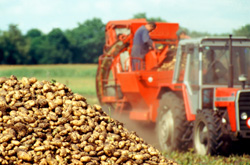The effectiveness of decoupling in agriculture
Decoupling of direct payments in agriculture is considered a progressive EU policy that removes the link between payments to farmers and production of specified commodities. It allows farmers to decide which crops to grow or which animals to produce based on market need rather than on direct payments they receive. This gives them more market freedom and encourages competition. The EU-funded project Genedec aimed to assess the decoupling concept. It evaluated the environmental and socioeconomic impacts of decoupling to improve the EU's CAP. The project put strong emphasis on assessing environmental indicators related to farming in order to address ecological concerns, supporting cross-compliance and general EU goals with respect to the environment. Genedec studied possible socioeconomic impacts on different regions in Europe and on the food chain based on linear programming or positive mathematical programming models. The project researchers and partners produced several valuable studies to this effect. They examined theoretical concepts behind decoupling and studied stakeholder reactions to a decoupled support system for agriculture. In addition, the project team investigated farm-level models and tools for quantitative assessments of shadow prices of land, quotas and trade of entitlements. It also studied models linking farm, markets and the environment. Regulation in European agriculture and environmental pressures were also looked at, so was nitrate leaching regulation. The resulting reports, recommendations and conceptual frameworks form a solid basis for further improvement of the CAP.







